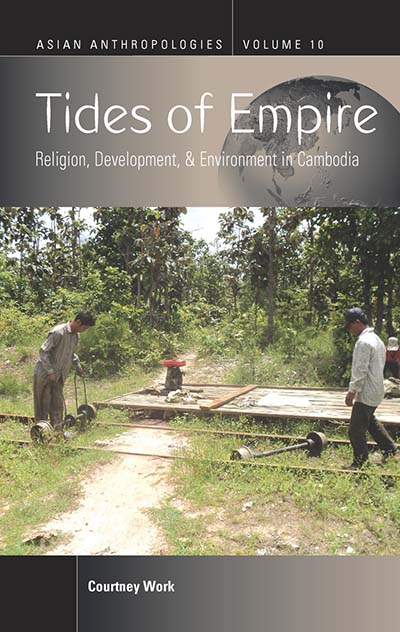“Meditative, and sometimes beautiful, Work’s voice is both humble and bold, modest and daring…Skilfully, she made of Khmer words and concepts– potentially so strange and alienating– the grounds for a shared experience.” • Journal of the Royal Anthropological Institute
“The book contains exciting discussions, especially for studying religion and environment…It is a provocative book that promises to reopen debates about state–society–environment arrangements in Cambodia both past and present and to enrich the anthropological study of human–nature relationships.” • South East Asisa Research
“Tides of Empire is a provocative book that advances long submerged connections among state development, layered religious practices, and ecological or place-making endeavors in Southeast Asia.” • Lorraine V. Aragon, University of North Carolina
At the forested edge of Cambodia’s development frontier, the infrastructures of global development engulf the land and existing social practices like an incoming tide. Cambodia’s distinctive history of imperial surge and rupture makes it easier to see the remains of earlier tides, which are embedded in the physical landscape, and also floating about in the solidifying boundaries of religious, economic, and political classifications. Using stories from the hybrid population of settler-farmers, loggers, and soldiers, all cutting new social realities from the water and the land, this book illuminates the contradictions and continuities in what the author suggests is the final tide of empire.
Courtney Work is Assistant Professor in the Department of Ethnology, National Chengchi University. She studied at Cornell University, and has published multiple papers on the intersections of religion, traditional practices, and the politics of land, global development, and climate change.
Related Link:
Read an interview with Courtney Work on the Berghahn Blog.
LC: HN700.3.A8 W67 2020
BISAC: SOC002010 SOCIAL SCIENCE/Anthropology/Cultural & Social; SOC042000 SOCIAL SCIENCE/Developing Countries; SOC039000 SOCIAL SCIENCE/Sociology of Religion


